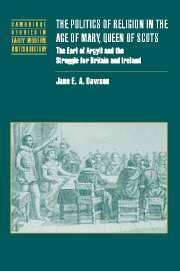 The Politics of Religion in the Age of Mary, Queen of Scots
The Politics of Religion in the Age of Mary, Queen of Scots Book contents
- Frontmatter
- Contents
- List of figures
- Acknowledgements
- List of abbreviations
- Prologue: 1560: British policies and the British context
- 1 Argyll's life and character
- 2 Semi-sovereign prince
- 3 The creation of a British policy: 1558–1560
- 4 The collapse of amity: 1561–1565
- 5 The reconfiguration of British politics: 1566–1568
- 6 The withdrawal from British politics: 1569–1573
- Conclusion: The earl of Argyll and British politics in the age of the three kingdoms
- Chronology, 1558–1573
- Bibliography
- Index
Prologue: 1560: British policies and the British context
Published online by Cambridge University Press: 20 July 2009
- Frontmatter
- Contents
- List of figures
- Acknowledgements
- List of abbreviations
- Prologue: 1560: British policies and the British context
- 1 Argyll's life and character
- 2 Semi-sovereign prince
- 3 The creation of a British policy: 1558–1560
- 4 The collapse of amity: 1561–1565
- 5 The reconfiguration of British politics: 1566–1568
- 6 The withdrawal from British politics: 1569–1573
- Conclusion: The earl of Argyll and British politics in the age of the three kingdoms
- Chronology, 1558–1573
- Bibliography
- Index
Summary
On 27 February 1560 in the town of Berwick, on the Anglo-Scottish border, a secret agreement was signed containing a range of unusual and profoundly important clauses. In the first place it constituted a diplomatic revolution. A group of Scots were abandoning their ‘auld alliance’ with France and embracing as allies their long-standing enemies, the English. The central purpose of the Treaty of Berwick was to furnish desperately needed English military aid to the Scottish Lords of the Congregation to prevent them being overrun by the French troops of Mary of Guise, Scotland's regent. From a Scottish perspective, the language employed to describe this diplomatic revolution was equally remarkable. Though exchanging one dominant protector for another, the treaty had carefully avoided any threat to Scotland's independence, in particular making no mention of England's imperial claims that had played such a prominent part in previous Tudor incursions across the Border.
Another unusual feature was that Elizabeth I of England concluded this formal alliance not with a fellow monarch, but rather with those Scots who were fighting against the regent and her daughter, the Scottish queen. In the volatile international situation of spring 1560, aiding rebellious subjects against their lawful rulers was a risky diplomatic gamble for the precarious Elizabethan regime. It also ran counter to all Elizabeth's political and personal instincts, yet the queen had been persuaded of its necessity by her chief adviser William Cecil, supported by her Privy Council.
Information
- Type
- Chapter
- Information
- The Politics of Religion in the Age of Mary, Queen of ScotsThe Earl of Argyll and the Struggle for Britain and Ireland, pp. 1 - 10Publisher: Cambridge University PressPrint publication year: 2002